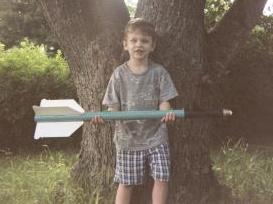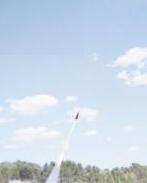The Launch Pad AIM-9L Sidewinder (Plan) Plan
The Launch Pad - AIM-9L Sidewinder {Plan}
Contributed by Dave Stout
| Construction Rating: | starstarstarstarstar_border |
| Flight Rating: | starstarstarstarstar |
| Overall Rating: | starstarstarstarstar_border |
| Manufacturer: | The Launch Pad  |
 Brief:
Brief:
The AIM-9L Sidewinder by the Launch Pad is a parachute recovered, scale model missile.
Construction:
I ordered the Plan-Pak, which contains a parts list, drawings, and VERY COMPREHENSIVE instructions. The parachute is one of TLP's own kits, a tough blue mylar design which includes swivels. Finally, I ordered a pack of their nice, SIMPLE motor hooks.
The instructions, although advanced, are very straightforward. The making of individual components is described in perfect detail, along with suggested materials. You'll be cutting, sawing, sanding, and trimming A LOT with this one. The builder even makes the lugs, centering rings, and motor block. Attention to detail is critical, but the project goes right along if you stick to the sequence. Don't expect to finish this overnight. This is an involved build, but if you have one plan-built bird under your belt you can make this one. FOLLOW THE DIRECTIONS to the letter and do not deviate unless you're sure of what you're doing. These are very well done and sound plans.
 I deviated from the plan in two ways. First, the forward (canard) fins were made of .031" G-10 instead of balsa. The thinness of this material made it very convincing in appearance, plus it will not dent or rip off (They're epoxied on.) The rear fins have 1/8" spruce cap strips attached to the top and trailing edges to minimize landing damage. The trailing edge cap strip is installed through the wall and glued to the bottom centering ring and the motor mount tube. CHECK your balance! My bird checked out as marginally stable and didn't come in until about 1-1/4 ounce of clay was added to the nose cone. This along with the slightly heavier build brought the weight of the Sidewinder up to 10 oz, 2 oz. heavier than advertised for the kit version. A demanding yet enjoyable project.
I deviated from the plan in two ways. First, the forward (canard) fins were made of .031" G-10 instead of balsa. The thinness of this material made it very convincing in appearance, plus it will not dent or rip off (They're epoxied on.) The rear fins have 1/8" spruce cap strips attached to the top and trailing edges to minimize landing damage. The trailing edge cap strip is installed through the wall and glued to the bottom centering ring and the motor mount tube. CHECK your balance! My bird checked out as marginally stable and didn't come in until about 1-1/4 ounce of clay was added to the nose cone. This along with the slightly heavier build brought the weight of the Sidewinder up to 10 oz, 2 oz. heavier than advertised for the kit version. A demanding yet enjoyable project.
What was the second deviation, the nose weight?
Finishing:
As in making of the parts and assembly, finishing/detailing is entirely up to the builder. Color and layout info is supplied in depth. The realism achievable with this plan is amazing. Take your time and you can build a KILLER replica! I detailed my kit carefully but didn't go overboard. Trim painting and lettering were not done in time for its maiden launches and photos.
Construction Rating: 4 out of 5
 Flight:
Flight:
D12-3's and -5's are recommended for the Sidewinder. Its first flight at the CMASS launch on July 7th was with a D12-3. Prep is standard issue except for the addition of a drilled bulk plate at the top of the airframe to prevent the chute from slipping down. I inserted a healthy dose of cellulose fiber insulation and prepped it normally. The motor is well retained with TLP's basic, sturdy motor hook. Why can't everyone else make them like this? The Sidewinder took off fairly quickly and boosted straight despite my worries about stability. It went to about 500'. I do NOT recommend the D12-5 for anything but dead calm days. It has since been flown with another D12-3 and with an Aerotech E25-4T & 18mm adaptor. The E flight was actually quite a barn burner and the Sidewinder grabbed some altitude fast. After motor burnout the fins could be heard whistling through the slipstream! It was still moving upward at ejection, with no apparent ill effects.
Recovery:
Shock cord was 1/4" sewing elastic, 3' long, attached by the standard tri-fold method and Titebond. The TLP 'chute deployed slowly but unfurled fully. The chute spins a lot on its swivels without tangling. Descent seems a bit quick. However, it returned the Sidewinder completely intact after its touchdown in the weeds. Two subsequent flights from my home field have resulted in no damage.
Flight Rating: 5 out of 5
Summary:
This is a great plan for the advanced builder. It yields a convincing, good-flying replica. This project is NOT for the faint of heart, though... expect to be tied up for a lot of evenings on this project. The tail of this rocket gets very sooty, probably due to the style of engine mounting.
Overall Rating: 4 out of 5
Other Reviews
- The Launch Pad Sidewinder AIM-9L By John Cummings (September 5, 2009)
This is the Launch Pad's scale Sidewinder AIM-9L missile model. This is a mid-power rocket with a parachute recovery. This kit comes with balsa planks, two body tubes, a plastic nose-cone, centering rings, and all other standard kit pieces. It also comes with putty for nose-cone weight. The shock cord was simple elastic, which was a bit inadequate for this great model. There are also lots ...
- The Launch Pad Sidewinder AIM-9L By Kevin Drayson
Mid-power scale model of the air-to-air missile. As with all rockets from The Launch Pad, this is a "builder's kit". The fins and various detail bits all have to be cut and assembled by the builder. Lots of fun if you enjoy that sort of thing, which I do. The package contained everything I needed: sheets of balsa for fins, dowels and balsa strips for details, paper templates for fins ...
 |
 |
Flights
Sponsored Ads
 |
 |











